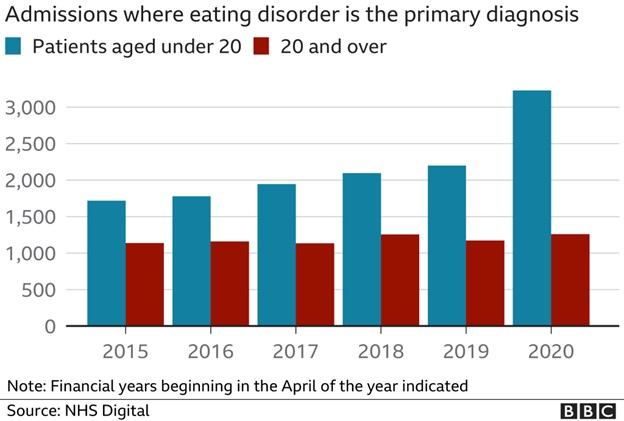By: Kim Hesano, RN-BSN
Do you find yourself or your child avoiding certain foods, even if it means missing out on a meal with friends or family? While picky eating can be frustrating, it is not always a cause for concern. However, for some people, avoiding certain foods goes beyond just being picky – it is a mental health condition known as Avoidant/Restrictive Food Intake Disorder (ARFID), which if ignored, can lead to serious consequences.
Over the past few years, eating disorders have become increasingly common, resulting in a dire need to recognize them so treatment can begin. In one study, admissions saw a rapid spike during the pandemic, with the number of patients under the age of 20 topping 3,000 in 2020.

While a variety of eating disorders exist, people typically are most familiar with anorexia nervosa and bulimia nervosa. Other eating disorders, especially ARFID, can be overlooked. WIthout increased awareness and screening, ARFID can go undiagnosed and untreated.
What is ARFID?
ARFID is a type of eating disorder that affects both children and adults. It is a relatively new diagnosis in the DSM-5 and used to be known as "Selective Eating Disorder." People with ARFID may restrict their food intake due to an overall lack of interest in food, a low appetite, or an aversion to a particular taste, texture, or smell. In some cases, those with ARFID may avoid entire categories of food, such as meats or vegetables, or avoid a certain type of food such as “creamy” or “soft.”
While many children may go through selective eating phases, those with ARFID do not get enough nutrients to grow and develop properly. This can cause weight loss, a failure to grow as expected, problems with healthy functioning of the body, and sometimes severe difficulties at school or work.
Watching your loved one struggle to eat and grow can be a devastating and frustrating ordeal, but it is important to approach ARFID with understanding and compassion. It can be a difficult struggle for those living with it, however, it is treatable.
ARFID vs Anorexia Nervosa
ARFID and anorexia nervosa can get confused as both disorders involve severe restriction of food. In both, this limited intake leads to significant weight loss or failure to grow, nutritional deficiency, cognitive difficulties, mood changes, and/or interference in psychosocial functioning. The one critical difference between the two–motivation.
Individuals with anorexia nervosa often have a distorted body image and an intense fear of gaining weight, or being “healthy” which drives their restrictive eating behaviors. They may also engage in compulsive exercise or purging behaviors in an effort to maintain a low weight or achieve further weight loss.
On the other hand, those with ARFID do not typically have these same levels of body image concerns or extreme fear of weight gain. Instead, their restrictive eating behaviors are often driven by low appetite or lack of interest in food, sensory issues, or other factors, such as a fear of choking or vomiting. This makes it difficult for them to consume certain foods or eat in certain situations. This can lead to social, emotional, and health complications.
ARFID and Mental Health Disorders
Eating disorders do not only affect a person's physical health. They also can have a significant impact on emotional, social, and mental health of an individual. While the physical effects of it may be more visible, the social, emotional, and mental health consequences can be just as severe and long-lasting.
In an article in the Journal of Eating Disorders, researchers found as many as 72% of individuals with ARFID also experience anxiety symptoms. Individuals with ARFID may have an underlying anxious temperament or anxiety disorder. They may also feel anxious about specific foods, textures, or situations that trigger their restrictive eating behaviors. For example, they may feel afraid from a history of choking, vomiting, or experiencing stomach pain after eating certain foods, leading to an increase in anxiety around mealtimes. This anxiety around mealtime can continue to decrease the diet of an individual with ARFID, leading to an increase in anxiety around new or different foods.
On a National Eating Disorders Association (NEDA) blog, authors Stephanie Elliot and Dr. Kim DiRé explain how ARFID can also be linked to depression for some individuals. It is common for patients with this disorder to experience social isolation, shame, and low self-esteem due to their limited food intake and difficulties eating with others. Children especially may struggle to understand why they feel different from their peers, or why they can not enjoy the same foods and activities as other kids. As a result, they may become withdrawn and avoid social events, further exacerbating feelings of isolation and depression.
Subtypes of ARFID
Eating disorders are complicated and there is not one cause or one reason they develop. Research does show however there are several reasons why someone might avoid or restrict their food intake. The most common reasons include sensory-based avoidance, negative experience with food, unrecognizable hunger cues, and/or poor appetite.
Sensory-Based Avoidance
Some people are extremely sensitive to the taste, texture, smell, or appearance of certain foods. They may become overwhelmed with new foods, or prefer certain things only at a specific temperature or consistency. They may avoid certain textures altogether. This is known as sensory-based avoidance or restriction of intake.
Negative Experience with Food
Others may have had a negative experience with food, such as choking or experiencing significant abdominal pain. This creates feelings of fear and anxiety around food or eating and leads to avoidance of certain foods or textures.
Moreover, some people may experience general worries about the consequences of eating that they find hard to explain. It is human nature to refrain from indulging in something that feels like a danger to us. This is exactly what patients with ARFID do! They restrict their intake to what they consider "safe" foods, leaving out much of what they may need to consume to thrive.
Unrecognizable Hunger Cues and Poor Appetite
In some cases, the patient may not recognize their body’s hunger cues. They may also generally have a poor or low appetite. Eating might seem like a chore to them rather than something to be enjoyed, resulting in a struggle to eat enough.
How is ARFID Diagnosed?
At McCaskill Family Services, our comprehensive eating disorder team performs a full evaluation of eating patterns and history, combined with a review of medical records. Families are often referred to us from a family doctor recognizing early ARFID warning signs, such as stress around meals or “falling off” growth chart trends. Other times a therapist or dietitian may recognize symptoms such as anxiety around social outings involving food, skipping meals or an increasing list of “fear foods.”
Can ARFID Be Treated?
Yes! Although ARFID is considered one of the newly recognized eating disorder diagnoses, recommended treatment has been quite successful. Like all eating disorders, ARFID is best treated with early intervention, a specialized comprehensive team, and significant family involvement and support.
It is important to note that ARFID is not a choice, nor a sign of weakness or willpower. It is a mental health condition which requires professional support and treatment. Recovery is possible for everyone, and at McCaskill Family Services, we are committed to providing our clients with a safe and supportive environment. Our team of clinical psychologists, dieticians, and medical professionals will work closely with you to develop a treatment plan that is tailored to your unique needs and goals.
Remember, early intervention is vital when it comes to eating disorders. The longer you wait to seek help, the harder it may be to recover. Do not hesitate to reach out to our eating disorder program if you suspect that you or your loved one may be experiencing ARFID. We are here to help you every step of the way!


